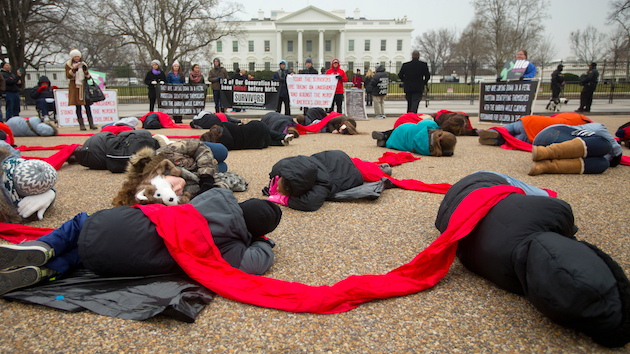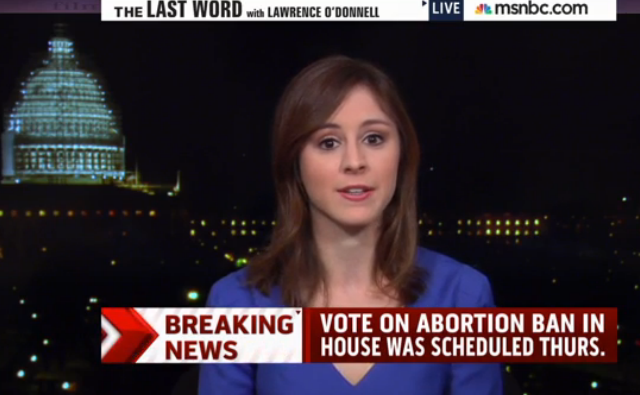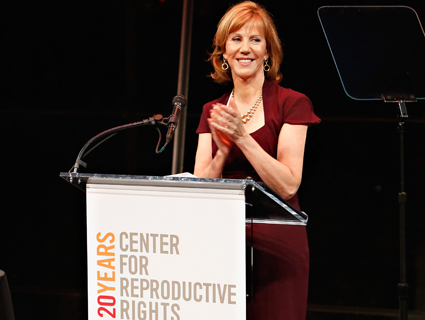
Anti-abortion protesters stage a "die-in" on the 42nd anniversary of Roe v. Wade, a day after the GOP delayed voting on a 20-week abortion ban.Pablo Martinez Monsivais/AP
Update May 13, 2015: House Republicans will bring the Pain-Capable Unborn Child Protection Act up for a vote on Wednesday.
A top priority for the new Republican Congress is passing a new law banning abortions after a fetus is 20 weeks old. But on Wednesday, GOP women concerned about the party’s image managed to delay the vote. The bill, however, is by no means dead. Here’s everything you need to know about the women in the GOP’s crosshairs.
Women who obtain abortions 20 weeks after conception fall into a few broad categories. But researchers have a hard time determining which category accounts for the largest share of these abortions. “Our surveys just don’t capture those women very well,” says Rachel Jones, a senior researcher with the Guttmacher Institute, a pro-abortion-rights think tank. This is partly because later abortions are very rare: In 2011, the most recent year for which there is sound data, only about 13,000 women terminated their pregnancies after 20 weeks, out of a total of about 1.06 million abortions.
Those categories include poor women who didn’t have the money for an earlier abortion, women who underwent a traumatic life event—such as divorce, abuse, or the death of their partner—or women who didn’t realize they were pregnant. Teenagers, who may not have regular periods or recognize the signs of pregnancy, and women who are overweight both tend to take longer to realize they are pregnant. Other women terminate their pregnancies due to fatal fetal anomalies. Often, those conditions aren’t recognizable until the fetus is at least 18 to 20 weeks old. “Say it’s a serious heart defect,” says Daniel Grossman, a member of the American Congress of Obstetricians and Gynecologists. “There isn’t a blood test for that. The fetus needs to be a certain size before you can see that. And then it may take a while for a woman to make up her mind about what to do.”
Anti-abortion-rights groups claims that they want to ban abortion at 20 weeks because, they argue, that’s the point at which fetuses experience pain. But the scientific consensus roundly rejects this idea. A review of more than 2,000 studies published in medical journals that appeared in the Journal of the American Medical Association found no evidence that fetuses at 20 weeks experience pain. (You can read more about why the GOP chooses to draw the battle line at 20 weeks here.)
Mother Jones asked a half-dozen women who terminated their pregnancies after 20 weeks to discuss their experiences. Here are some of their stories:
Abbey Willson, 37
When my husband and I decided to start trying for our first child, we hit the jackpot right away. We were just so excited. I was nervous too. My brother and my dad have a genetic condition called Ectrodactyly. It causes deformities in the feet and hands. My brother and my father’s legs are deformed below the knee, and my brother’s forefinger and thumb are fused on one hand. Later I would learn that the effects can be a lot more extensive. My brother and father lead pretty normal lives. But I didn’t appear to have the condition. So a genetic counselor reassured me that I couldn’t pass it on.
When we went in for an ultrasound at about 22 weeks, we asked the technician to count the fingers and toes. She got very quiet, and she didn’t want us to see the screen. It turns out I am a carrier. My condition just manifests in really, really superficial ways, like, my ankles roll easily.
Looking at my son, the technician couldn’t see any hands. At least one arm—probably both—was missing below the elbow. We started looking into prosthetics for our son. But then a second ultrasound confirmed that he not only had no arms at all, but one of his legs was missing bones. His pelvis was malformed and he would never be able to sit up. There were concerns his kidneys were malformed. He would start having surgery almost immediately in the first weeks of his life. He wouldn’t be able to use most prosthetics. It wasn’t just, he has no arms. His life would be painful, immediately, and he would never live independently.
The decision to terminate was not a hard one for us. Our whole family was very supportive. My father said—and I won’t forget this because we weren’t close before that—”Both as a parent of a child with a disability, and as someone with this condition, I think you’re doing the right thing. It’s so severe in your son.”
We suffered a lot. We grieved for a long time. Just because it’s an easy choice doesn’t mean it’s a painless one. But nobody should be forced to make their child suffer.
Heather, 43
There were no high risk factors. All of my early screenings were normal. You name it, and I was fine. But I was over 35, and my insurance covered an anatomy scan. I was just past the 20-week mark. The sonographer got very quiet. She said, “I have to go get the doctor.”
They diagnosed my son with alobar holoprosencephaly. His brain did not divide into two hemispheres—which happens pretty early, but it’s not easily detectable. Holoprose has a spectrum. It can be as simple as a cleft lip, to the other extreme, a cyclops. Alobar is the very worst form. Massive organ failure. They didn’t even have an explanation for how I made it this far without miscarrying. And they had no guarantee that I wouldn’t miscarry before I was full term. I got a second opinion: “If he makes it to term, he will undoubtedly die very quickly.”
The doctor who saw me through the termination, I call him my angel of mercy. If it wasn’t for that man’s care, I never would have tried for the daughter I have today.
Twenty-week bans are devastating for women like me. For any woman—I don’t care if you’re 15 and you got knocked up in the back of your mom’s car. Because you never know. If you’d have told me years ago that I’d be sitting here having this conversation with you, I’d have laughed.
Nobody can tell me I didn’t do the right thing for my son. And I will be damned if I’m going to keep quiet. Because that’s my son, and his story is all I have of him.
Alexis Stool, 32
I was on birth control—the kind where you only have your period four times a year. So I had no reason to think that I was pregnant. When I missed my period three months after what turned out to be the start of my pregnancy, I called my gynecologist’s office. “Oh, don’t worry about it,” they told me. “That can happen.”
Eventually, something just felt weird. I took a pregnancy test, and it came back positive. “Oh,” I thought. “This must be a recent pregnancy.” I didn’t look six months pregnant—which I was. I’d gained a little weight, but my boyfriend had seen me naked. My mom had seen me in my underwear. Nobody said, “You look pregnant.”
I was 27 weeks pregnant, and I’d had absolutely no idea. I would have had the baby. But the problem for me was, I’m on medication for major depressive disorder and anxiety. So I’d been on anti-depressants. Mood stabilizers. Klonopin. There was no telling what went wrong with the pregnancy while I was taking those. The severity of it—it could be anything. I didn’t want to bring a child into this world who had a non-functioning, miserable life.
There were two clinics in the United States where you can get an abortion up to 30 weeks. I went to Albuquerque, New Mexico. It cost $11,000, which my parents fortunately could afford. There were people there from Canada. Some people who were there, it was like, “I already have four kids. I really can’t afford another.”

Sari, 44
We felt the baby kicking. The kicking—it tells you that the baby is thriving. So my husband and I were shocked when, in the second trimester, we had a positive screen for Trisome 13. We were told that a lot of times, maternal age can cause a false positive. I thought, “Oh, maybe it’s because I’m on the older side. It must be a mistake.”
The perinatologist told us that some organ parts were just “missing.” That word is burned into my memory. We got a second opinion. Both doctors told me that it’s struggling to live. It will probably die in utero. Babies with this condition that are born live die minutes or hours after they are born. I was told it would impact my health if I continued the pregnancy.
But we waited for more confirmation. There were a lot of things that my husband and I did, in our minds, to give ourselves hope that we wouldn’t have to terminate this pregnancy. Maybe the doctors are wrong. Maybe if we wait, the baby will recover. The results were 97 percent certain. The other 3 percent—that might be us.
I searched online for later abortion. A lot of the websites that came up were baby-killer websites. You kind of unassumingly click on them, and then you’re viewing these gory images of dismembered fetuses. Making you really fearful of this procedure. I had nightmares. I’m sure it had to do with those images. Or it was, people saying, I had the same diagnosis, and now my baby is sitting across the table from me, and she’s fine.
But I know now that wasn’t going to be the case for me. I was right at the 20-week mark when the company handling the tests confirmed our diagnosis. We just happened to be lucky that there was a clinic 20 minutes from my house, with a full-time anesthesiologist. Some women have to labor and deliver their abortions. But my option was so painless, and I was grateful for that.
Julie Bindeman, 36
All of my screenings looked good and we started preparing for our son to have a new brother or sister. The ultrasound technician was really chatty. She told us we were having a boy. When went to the OB-GYN’s office, she said she was so sorry. “Oh,” we said. “So she made a mistake, we’re having a girl?” The doctor looked at us like we were crazy. “They didn’t tell you anything, did they?”
There was too much fluid in the skull for the brain to develop. They sent us to Children’s National Medical Center to get a better sense of what was going on. I was almost 21 weeks along. We were told that in the best-case scenario—if our son survived, which they couldn’t guarantee—he may never mentally progress. And he would never move independently. He would never speak, he would never feed himself, he would never walk, he would never hug his mother. We decided that that was not a life, and that was not fair to our son. And we made the heartbreaking choice to end the pregnancy.
I shared my story with the South Caroline Senate in 2012 when they had a 20-week abortion ban come up. One of the senators who I shared it with individually, he was so struck that he changed his mind. He had been planning to vote for the ban. People are open-minded. A lot of them just don’t know what women like me go through.
April Salazar, 38
At 18 weeks, my husband and I got our second-trimester anatomy scan. That’s when we found out the baby had lethal skeletal dysplasia. His chest cavity was too small, and he would never be able to breathe on his own. We were told that after I gave birth, he would die within the first hours, or days, or weeks. Whenever we lost him, it would be to suffocation.
We did an amniocentesis that was sent off to Johns Hopkins for a definitive diagnosis. I basically sat on the initial diagnosis for two weeks, hoping it wouldn’t be confirmed. During those two weeks, Congress passed a 20-week abortion ban. The rhetoric around it was, fetuses can feel pain at 20 weeks. I was horrified to look at those headlines. It wasn’t until I read that the science behind this was total bunk that I felt better.
I think politicians who support these bills must be aware of stories like mine. They have to be. I think they feel personally compassionate but decide it’s politically expedient for them to vote for these bans anyway. They’ll say, “Oh, we have exceptions for hard cases.” But that’s absolutely ridiculous. Everything about a late termination is already so incredibly difficult. Even just picking up the phone to make the appointment. It’s just adding another hurdle. It’s just cruel.
Christy Zink
The brain wasn’t formed properly. We met with the radiologist, we met with the geneticist, we talked to the OB-GYN—no one gave us even any glimmer of hope. If the baby did live, we were facing near-constant seizures. I had an abortion a few days before 22 weeks. And not long after that, I started to get interested in talking about my story.
Rep. Louie Gohmert questions Christie Zink
I testified before Congress about their 20-week ban in 2013. [Rep.] Louie Gohmert [R-Tex.] spun this story about his own experience, and a baby with a totally different disability. He said to me, “Wouldn’t it have been the more educated thing to do, to wait and see?” When in fact I did make a very educated decision, after consulting with some of the best doctors in the country. This sort of notion, that women who are in this situation are sort of helpless and we aren’t making informed decisions, does not describe the experience of anyone I know.
He told this hope-against-hope story: If we only hope hard enough and hold out long enough, the medical science would turn into magic. But that’s just willful ignorance.















